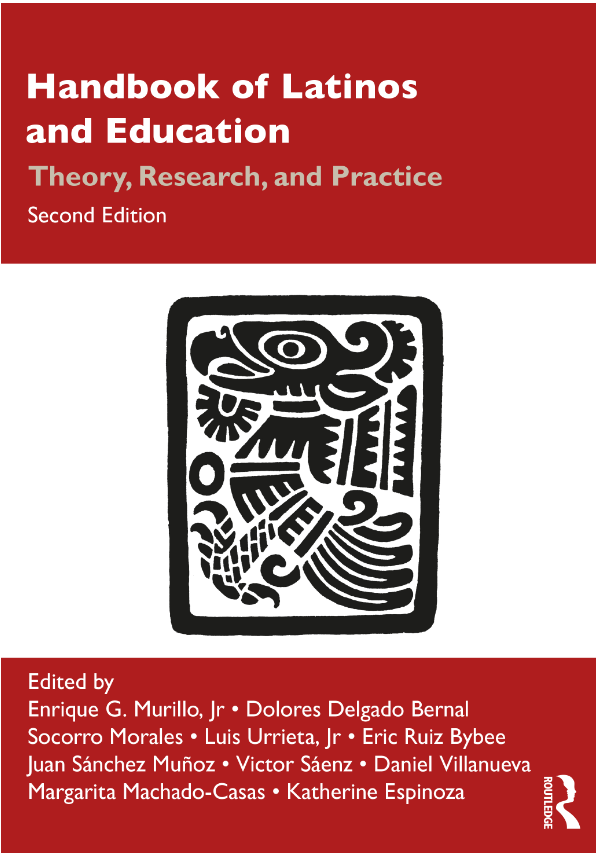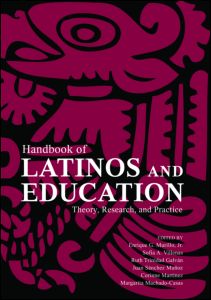2nd Edition Handbook of Latinos and Education: Theory, Research, and Practice - FORTHCOMING by Routledge

Book Description
Now in its second edition, this Handbook offers a comprehensive review of rigorous, innovative, and critical scholarship profiling the scope and terrain of academic inquiry on Latinos and education. Presenting the most significant and potentially influential work in the field in terms of its contributions to research, to professional practice, and to the emergence of related interdisciplinary studies and theory, the volume is now organized around four tighter key themes of history, theory, and methodology; policies and politics; language and culture; teaching and learning. New chapters broaden the scope of theoretical lenses to include intersectionality, as well as coverage of dual language education, discussion around the Latinx, and other recent updates to the field.
The Handbook of Latinos and Education is a must-have resource for educational researchers; graduate students; teacher educators; and the broad spectrum of individuals, groups, agencies, organizations, and institutions that share a common interest in and commitment to the educational issues that impact Latinos.
* Related Subjects: Multicultural Education, Sociology of Education, Race & Ethnic Studies
Buy Now - 2nd Edition Handbook of Latinos and Education
Forthcoming by Routledge
452 Pages 14 B/W Illustrations
Official publication date: July 30, 2021
Handbook is already available for pre-order, and will ship after 7-30-21
*Free standard shipping on every order across the globe
20% Discount available with the attached flyer
Enter the code FLY21 at checkout
Hb: 978-0-367-26212-9 | $280.00 Discount Price
Pb: 978-0-367-26213-6 | $104.00 Discount Price

Routledge Books, Taylor & Francis Group
Providing a comprehensive review of rigorous, innovative, and critical scholarship relevant to educational issues which impact Latinos, this Handbook captures the field at this point in time. Its unique purpose and function is to profile the scope and terrain of academic inquiry on Latinos and education. Presenting the most significant and potentially influential work in the field in terms of its contributions to research, to professional practice, and to the emergence of related interdisciplinary studies and theory, the volume is organized around five themes:
- history, theory, and methodology;
- policies and politics;
- language and culture;
- teaching and learning;
- resources and information.
The Handbook of Latinos and Education (HLE) is a must-have resource for educational researchers, graduate students, teacher educators, and the broad spectrum of individuals, groups, agencies, organizations and institutions sharing a common interest in and commitment to the educational issues that impact Latinos.
Journal of Latinos and Education Project

Routledge Journals, Taylor & Francis Group
The Journal of Latinos and Education (JLE) provides a cross-, multi-, and interdisciplinary forum for scholars and writers from diverse disciplines who share a common interest in the analysis, discussion, critique, and dissemination of educational issues that impact Latinos. There are four
broad arenas which encompass most issues of relevance: (1) Policy, (2) Research, (3) Practice, and (4) Creative & Literary works.
JLE encourages novel ways of thinking about the ongoing and emerging questions around the unifying thread of Latinos and education. The journal supports dialogical exchange--for researchers, practitioners, authors, and other stakeholders who are working to advance understanding at all levels and aspects--be it theoretical, conceptual, empirical, clinical, historical, methodological, and/or other in scope.
JLE seeks to identify and stimulate more relevant research, practice, communication, and theory by providing a rich variety of information and fostering an outlet for sharing. The various manifestations of the diverse frameworks and topical areas typically range anywhere from--but aren't limited to--theoretical and empirical analyses, policy discussions, research reports, program recommendations, evaluation studies, finding and improving practical applications, carefully documenting the transition of theory into real-world practice, linking theory and research, new dissertation research, literature reviews, reflective discussions, cultural studies, and literary works.